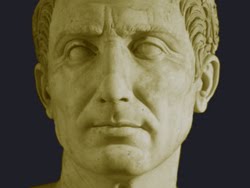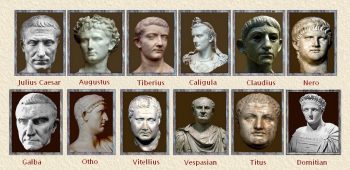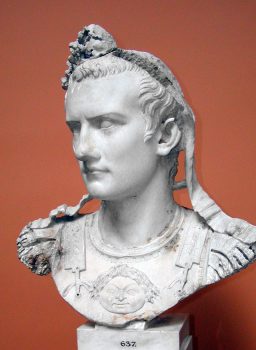Monthly Latin Spotlight Text: 12 Caesars Posted by Brittany Britanniae on May 6, 2015 in Latin Language
Salvete Omnes!
Welcome to the second Monthly Latin Spotlight Text Post! By this I mean to summarizes a text of Latin in all its major facets and include an excerpt from the text with Latin and English. This week I thought we would spotlight one of the most interesting, juicy, and somewhat gossipy book from Roman Antiquity.
Name: The Twelve Caesars
Also Known As: De vita Caesarum (Latin: About (or On) the Life of the Caesars)
Date: 121 AD
Author(s): Gaius Suetonius Tranquillus or simply referred to as Suetonius
Type of Text: Historic, Opinion Piece & Gossip/
Genre: Biography
Content:
The book contains twelve biographies of Julius Caesar and the first 11 emperors of the Roman Empire. These 11 other emperors include: Augustus, Tiberius. Caligula, Claudius, Nero, Galba, Otho, Vitellius, Vespasian, Titus, and Domitian.
Type of Latin:
Classical Latin
Distinguishing Features:
The book can be described as racy, packed with gossip, dramatic and sometimes amusing. There are times the author subjectively expresses his opinion and knowledge. Regardless of the former, The Twelve Caesars is considered very significant in antiquity and remains a primary source on Roman history.
Where is it today:
The oldest surviving text is referred to as M or Codex Memmianus (or Paris, lat. 6115), the oldest extant manuscript, written at Tours ca. 820 and apparently with no direct descendants. By direct descendants, it means that they are no other manuscripts that follow or descend from it.
In Pop Culture:
Robert Graves, though most famous for his historical novels I, Claudius and Claudius the God (later dramatized by the BBC) obtained most of his material for his books from Suetonius’ The Twelve Caesars. There series is currently in the works to be adapted by BBC & HBO for a new miniseries.
LATIN & ENGLISH TRANSLATION:
Incitato equo, cuius causa pridie circenses, ne inquietaretur, viciniae silentium per milites indicere solebat, praeter equile marmoreum et praesaepe eburneum praeterque purpurea tegumenta ac monilia e gemmis domum etiam et familiam et supellectilem dedit, quo lautius nomine eius invitati acciperentur; consulatum quoque traditur destinasse. (Caligula LV.III)
He used to send his soldiers on the day before the games and order silence in the neighbourhood, to prevent the horse Incitatus from being disturbed. Besides a stall of marble, a manger of ivory, purple blankets and a collar of precious stones, he even gave this horse a house, a troop of slaves and furniture, for the more elegant entertainment of the guests invited in his name; and it is also said that he planned to make him consul. (Caligula LV.III)
PLEASE COMMENT BELOW IF YOU WOULD LIKE ONE OF YOUR FAVORITE LATIN TEXTS FEATURED IN THE MONTHLY SPOTLIGHT POST!

Keep learning Latin with us!
Build vocabulary, practice pronunciation, and more with Transparent Language Online. Available anytime, anywhere, on any device.
About the Author: Brittany Britanniae
Hello There! Please feel free to ask me anything about Latin Grammar, Syntax, or the Ancient World.







Comments:
MunaK:
Virgil’s Aeneid – one of the greatest epics of all time!! Any of the books :))